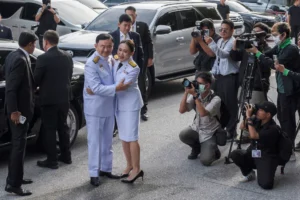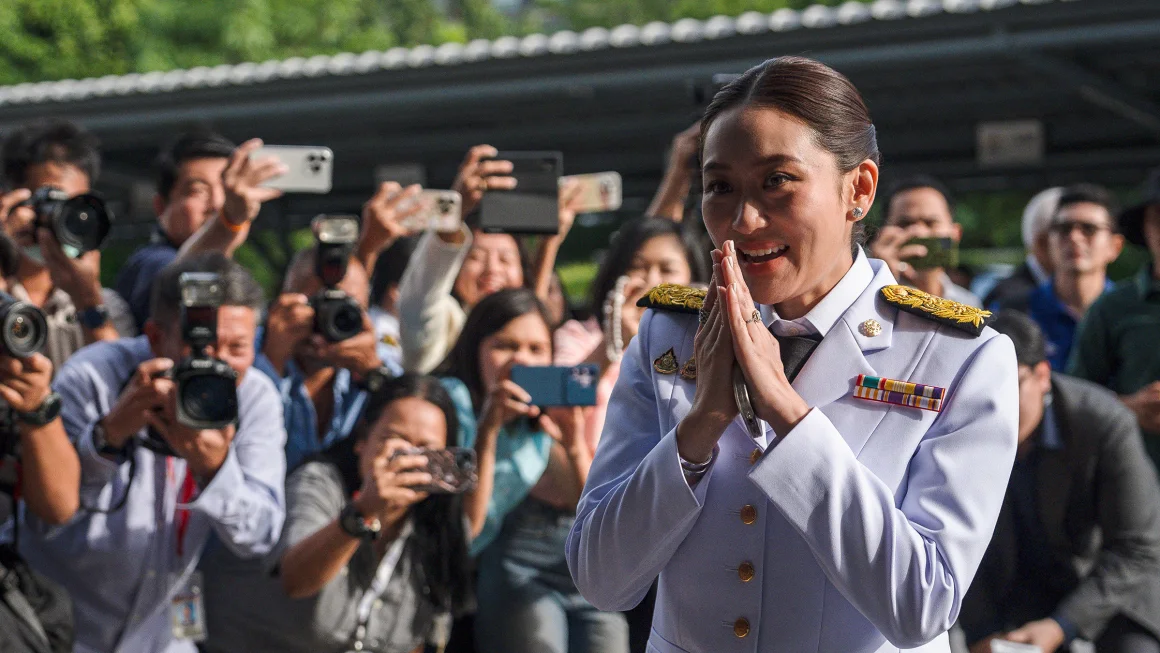In a country where politics often resembles a turbulent roller coaster, Thailand’s new prime minister, Paetongtarn Shinawatra, has emerged as a beacon of both continuity and change. At just 37 years old, she not only becomes Thailand’s youngest prime minister but also carries the weight of a political legacy that has shaped the nation’s landscape for decades. With her appointment, Thailand stands at the crossroads of tradition and modernity, as a new chapter begins under the leadership of a young woman from one of the most influential families in Thai politics.
The Shinawatra Legacy: A Dynasty’s Enduring Influence

A Political Dynasty Like No Other
The Shinawatra name is synonymous with Thai politics, a family that has commanded both reverence and resentment. The dynasty began with Thaksin Shinawatra, a telecom tycoon who became prime minister in 2001 and quickly built a powerful political machine through his populist policies. Thaksin’s influence was profound, particularly among rural voters who benefited from his government’s healthcare initiatives, debt relief programs, and infrastructure projects.
However, Thaksin’s tenure was not without controversy. His government was accused of corruption, and his increasing influence over key institutions led to tensions with Thailand’s conservative elite. In 2006, Thaksin was ousted in a military coup, and he fled the country to avoid corruption charges. Despite his exile, Thaksin’s presence loomed large over Thai politics, with his allies continuing to win elections only to be unseated by coups or court rulings.
Thaksin’s younger sister, Yingluck Shinawatra, carried the family torch when she became Thailand’s first female prime minister in 2011. Yingluck, like her brother, faced immense pressure from the conservative establishment, and her government was ultimately overthrown in a 2014 coup. The Shinawatra family’s political journey has been one of triumph and turmoil, with each chapter reflecting the broader struggles within Thai society.
Paetongtarn Shinawatra: Inheriting the Mantle
Paetongtarn’s rise to power is the latest chapter in the Shinawatra saga. As the daughter of Thaksin, she represents both continuity and a break from the past. Unlike her father and aunt, Paetongtarn has taken a more measured approach, seeking to balance the populist appeal that has defined her family’s politics with a new vision for Thailand’s future.
Her appointment as prime minister follows the dismissal of her predecessor, Srettha Thavisin, by the Constitutional Court — a move that many saw as yet another attempt by the conservative establishment to weaken the Shinawatra influence. Despite these challenges, Paetongtarn’s ascent to power reflects the enduring support for the Shinawatras, particularly among rural voters who continue to see the family as champions of their interests.
Paetongtarn’s leadership will be closely watched as she navigates the complex political landscape in Thailand. Her success will depend not only on her ability to govern effectively but also on her capacity to bridge the deep divides within Thai society.
The Royal Endorsement: A Symbol of Legitimacy and Challenge

King Vajiralongkorn’s Role in Modern Thai Politics
In Thailand, the monarchy plays a crucial role in the nation’s political life, often serving as a stabilizing force amid political turmoil. The endorsement of the prime minister by the king is more than a mere formality; it is a powerful symbol of legitimacy. When King Maha Vajiralongkorn officially endorsed Paetongtarn Shinawatra as prime minister, it marked a significant moment in her political career, signaling her acceptance by one of the country’s most revered institutions.
However, royal endorsement does not guarantee smooth sailing. Paetongtarn’s predecessors, including her father and aunt, also received the king’s endorsement, only to be ousted by coups or court rulings. The endorsement, while important, is just one piece of the puzzle in a country where political power is fragmented and contested.
Paetongtarn’s relationship with the monarchy will be a key factor in her tenure as prime minister. She has already shown her respect for the institution by kneeling before the king’s portrait during the endorsement ceremony — a gesture that underscores the importance of the monarchy in Thai society. How she navigates the complexities of this relationship, particularly in the face of potential challenges from conservative forces, will be critical to her success.
A New Era or History Repeating?
The question on many observers’ minds is whether Paetongtarn’s appointment signals a new era for Thailand or if it is simply history repeating itself. The Shinawatra family has faced relentless opposition from the military and conservative elites, leading to multiple coups and political crises. While Paetongtarn brings a fresh perspective to the table, she is also deeply connected to a legacy that has been both celebrated and vilified.
Paetongtarn’s challenge will be to assert her own identity and leadership style while managing the expectations and influences of her family’s political legacy. She has already indicated that while she may seek advice from her father, she intends to govern on her own terms. This balancing act will be crucial as she seeks to establish her authority and build a government that can withstand the pressures that have brought down her predecessors.
Governing in a Divided Nation: The Challenges Ahead

Navigating Thailand’s Deep Political Divides
Thailand is a country deeply divided along political, social, and economic lines. The urban-rural divide, in particular, has been a significant factor in the country’s political landscape, with the Shinawatra family’s populist policies appealing strongly to rural voters while alienating many in the urban middle and upper classes. Paetongtarn inherits a nation where these divisions are still very much alive.
Her ability to govern effectively will depend on her capacity to bridge these divides and build a coalition that can address the needs of all Thais. This will not be an easy task, as the country’s political landscape remains fraught with tension and the potential for conflict. The conservative establishment, which has consistently opposed the Shinawatras, is still a powerful force, and Paetongtarn will need to navigate this landscape carefully to avoid the pitfalls that have ensnared her predecessors.
One of Paetongtarn’s key challenges will be to manage the expectations of her supporters while also addressing the concerns of those who are wary of her family’s influence. Her promise to put the nation’s problems first and cooperate with all parties is a step in the right direction, but delivering on this promise will require significant political skill and diplomacy.
Economic and Social Reforms: A New Vision for Thailand
Paetongtarn’s government will also need to tackle the pressing economic and social issues facing Thailand. The country has been hit hard by the global economic downturn, with rising unemployment, inflation, and a struggling tourism sector. Paetongtarn has pledged to continue pushing a soft-power initiative that taps into Thailand’s rich cultural heritage and promotes tourism, but she will also need to address the deeper structural issues in the economy.
Socially, Paetongtarn faces the challenge of navigating Thailand’s complex and often contentious issues, such as education reform, healthcare, and income inequality. Her predecessors made significant strides in these areas, particularly through policies that benefited rural communities, but these gains have been undermined by political instability and economic challenges.
Paetongtarn’s ability to implement meaningful reforms will be a key test of her leadership. She has the opportunity to build on her family’s legacy by addressing the root causes of Thailand’s social and economic problems, but she will need to do so in a way that unites rather than divides the country.
Also Read: https://newsreporto.com/tragedy-in-the-skies-the-sao-paulo-air-disaster/
The Road Ahead: A Balancing Act of Legacy and Leadership
Paetongtarn’s Own Path Amidst the Shadows of the Past
As Thailand’s youngest and only the second female prime minister, Paetongtarn Shinawatra stands at a unique crossroads. Her political lineage is both a powerful asset and a potential burden. On one hand, her family’s legacy provides her with a strong support base and a well-established political network. On the other hand, it ties her to a past marked by conflict with Thailand’s conservative establishment, raising questions about whether she can escape the cycle of political turmoil that has plagued her predecessors.
Paetongtarn has already shown a willingness to chart her own course. Her decision to enter politics and take on the mantle of leadership demonstrates both courage and a commitment to public service. However, she must be careful not to be overshadowed by the past. Paetongtarn’s challenge will be to assert her own vision for Thailand while managing the expectations and influences that come with her family name.
Her ability to navigate these complexities will determine whether she can break the cycle of coups and court rulings that have defined Thai politics for so long. Paetongtarn’s tenure as prime minister will be a balancing act of legacy and leadership, one that requires both a deep understanding of Thailand’s political landscape and the ability to inspire confidence in a new direction.
Building a Government for All Thais
Ultimately, Paetongtarn’s success will depend on her ability to build a government that represents all Thais, not just her family’s traditional support base. This will require a commitment to inclusivity, transparency, and accountability — values that have sometimes been lacking in Thai politics.
Paetongtarn can rise to this challenge, she has the potential to lead Thailand into a new era of stability and prosperity. Her success will not only be a victory for her family but also a turning point for a nation that has struggled to find lasting peace and progress.
Paetongtarn Shinawatra’s ascent to the role of Thailand’s prime minister marks a significant moment in the country’s political history. As she steps into this challenging role, she carries with her the weight of a powerful legacy and the hopes of millions of Thais who seek a better future. Whether she can navigate the complexities of Thai politics and lead the country toward a new era remains to be seen, but one thing is certain: her journey will be one of the most closely watched in Thailand’s history.


Fourweekmba This was beautiful Admin. Thank you for your reflections.
BaddieHub I very delighted to find this internet site on bing, just what I was searching for as well saved to fav